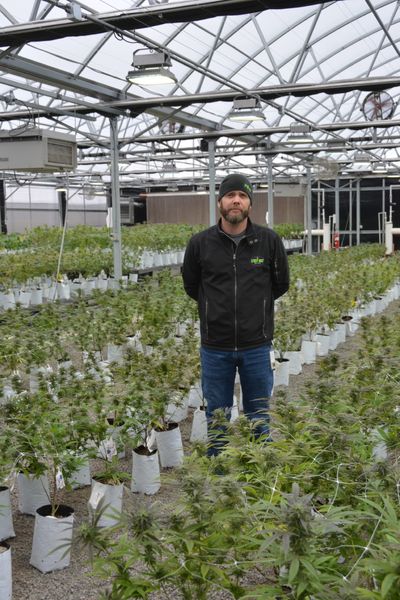Yakima commissioners plan crack-downs on cannabis businesses

Legal cannabis entrepreneurs and elected officials statewide are watching a brewing conflict in Yakima County between county commissioners and local growers and processors.
Jeffrey McPhee, Chief Operating Officer of Sticky Budz, a producer/processor in rural Yakima County, has organized a group of about 28 processors and retailers who are fighting to continue operating legally in unincorporated areas of the county.
The group is called the Cannabis Producer Processor Trade Association, and McPhee says members are prepared to go to court to defend themselves.
“The Yakima Valley is just an ideal place to grow the stuff,” he said. “There’s a reason why pot grows so well here—it’s the same for hops and apples.”
Although Initiative 502 passed in 2012 allowing the sale of recreational marijuana throughout Washington State, 58 percent of Yakima County voters rejected the initiative.
That spurred Yakima County’s commissioners to pass an ordinance three years ago, along with several other Eastern Washington counties, to ban the recreational production and sale of marijuana in unincorporated areas.
However, at the same time, Union Gap, directly adjacent to the city of Yakima and the second-largest town in Yakima County, approved the sale of recreational products inside city limit in summer 2014.
Union Gap’s successful example led to pressure on Yakima’s City Council, which allowed retailers to locate inside city limits in 2016. Registered medical dispensaries and growers were already legal in the county.
But when Washington’s Legislature voted in 2015 to combine medical and recreational producers and retailers, the new rules meant all growing and processing operations in Yakima County would no longer comply with the county’s ordinance against recreational activity.
McPhee opened the county’s first medical dispensary in 1996. After some initial suspicion when he applied for the necessary permits, he says he never had any problems until the current controversy.
“It seems like the commissioners believe that marijuana’s OK for sick people, but not healthy people,” he said. The recreational ban prevents even the growing or processing of medical-grade marijuana, he said.
Being able to grow and consume is a personal issue for McPhee, who was prescribed cannabis by his doctor after medical treatments for a serious digestive ailment left him struggling with his appetite.
“I smoke in order to keep my weight up,” he said. He couldn’t afford to buy medicinal marijuana, so he learned how to grow it himself.
Sticky Budz, his company, is planning an $8 million expansion this year. It grows marijuana and processes distillates. The company also plans a new 60,000-plus square foot greenhouse at its secure location 18 miles south of Yakima.
Currently, the operation employs 40 people, which increases to about 60 around harvest.
During a recent tour, McPhee said county commissioners have been on edge since 2015, but didn’t have funds or personnel budgeted for enforcement.
In November, an advisory vote asked citizens whether to keep the ban in place or remove it. A majority of voters, 60.57 percent, approved continuing the ban, which McPhee and others suspect was more due to confusion with its wording rather than strong anti-pot feelings.
Plus, city residents were allowed to vote, although the ban only affects unincorporated areas.
The Yakima Herald-Republic newspaper ran an informal online poll after the election that showed over 62 percent of respondents were confused about the ballot language.
In a guest column following the advisory vote, Yakima County Commissioner Mike Leita warned growers that commissioners now have adequate direction from citizens.
“County legal action is in process and therefore the (board) is unwilling to make further public comment,” he wrote.
The column accuses area marijuana processors of “disregarding the will of the people,” and uses the advisory vote as justification to uphold the ban.
“The ordinance remains in place as the result of your vote. Unfortunately, marijuana advocates are only concerned with their business interests and to hell with the voters,” the commissioners wrote.
The column also states that the county plans to launch enforcement actions in 2018, and included more enforcement money in the county budget.
It began the effort in early February by filing a court action against The Canyon, a retailer north of the City of Yakima. The complaint claims the stores is violating the ban against growing, processing or selling recreational marijuana.
The complaint also seeks an abatement order, which would allow county officials to enter the property, shut it down and remove any items that violate the ban. Abatement would also shield the county form any liability of any damaged or lost property.
McPhee says he’s not afraid of the challenge, and he’s met with commissioners several times in the last year, but they’ve refused a tour of the facility.
“The county’s clear they’re only going to make an example of one of us,” he said. “Other people who’ve come down here are kind of surprised when they see this is a real business that runs just like any other one does.”
He notes that the marijuana industry has already brought many jobs and even tourism to the area.